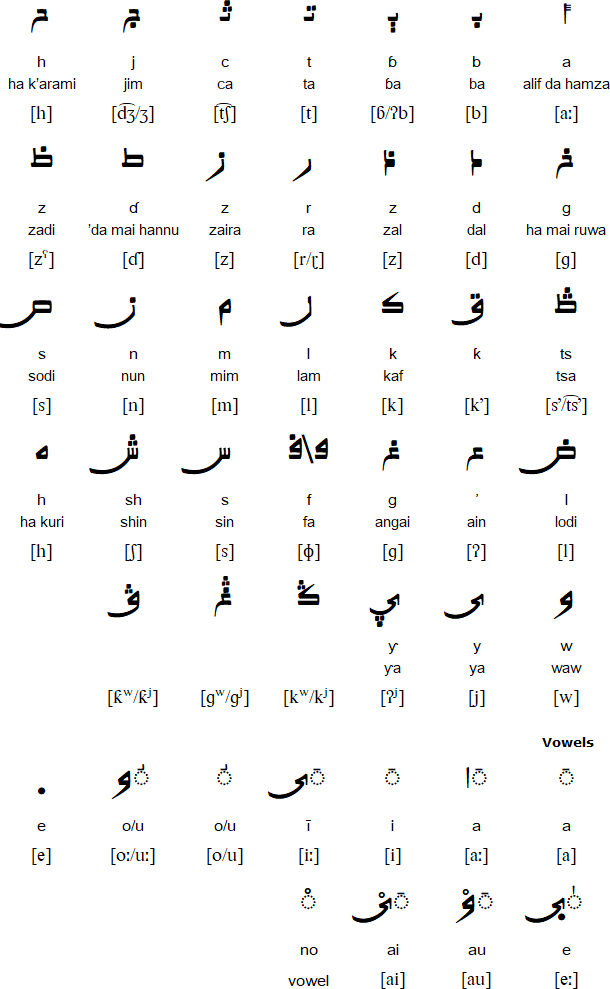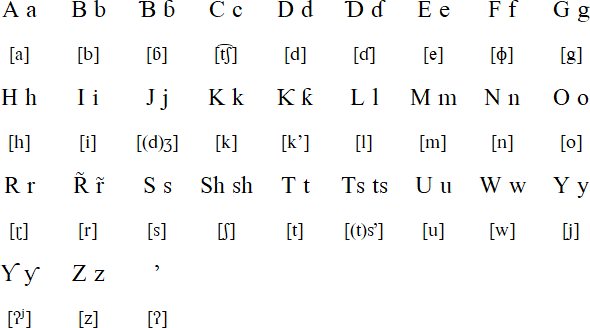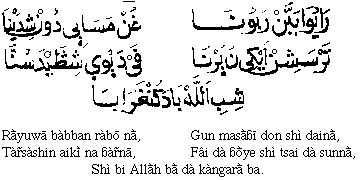Hausa is a West Chadic language spoken mainly in Nigeria and Niger, and in a number of other countries. Estimates of the total number of Hausa speakers range from 72 million to 150 million. In 2018 there were about 53.7 million speakers of Hausa in Nigeria, where it is the de facto provincial language in the northern region, and is used in the media and literature.
In 2017 there were about 15.5 million Hausa speakers in Niger, including 11 million native speakers. Hausa is an officially recognised language and is used in education and trade. Hausa is also an official language in Ghana, where there are about 565,000 speakers.
Other countries with significant numbers of Hausa speakers include Benin (1 million), Sudan (740,000), Chad (398,000), Côte d'Ivoire (395,000) and Cameroon (312,500) [source].
Hausa is also known as Abakwariga, Habe, Haoussa, Hawsa, Hausawa, Kado or Mgbakpa. Dialects include: Daura, Kano, Katagum, Hadejiya, Sokoto, Gobirawa, Adarawa, Kebbawa, Zamfarawa, Katsina and Arewa. The Daura (Dauranchi) and Kano (Kananci) dialects are considered standard, and are used on international radio stations such as the BBC, Voice of America and Deutsche Welle.
Since the beginning of the 17th century, Hausa has been written with a version of the Arabic script known as ajami. Most of the early writing in Hausa was Islamic poetry or on Islamic themes. Ajami is still used, mainly to write poetry, but also for at least one newpaper and some books. There is no standard spelling system for Hausa written with the Arabic script, so there is some variation in spelling between different writers.
The Arabic script shown below uses a font based on styles of writing used in the Kano region of Nigeria and Niger. It is sometimes known as Sudani Kufi or Rubutun Kano. The Naskh style script is also used.
A version of Hausa written with the Latin alphabet and known as boko began to emerge during the 19th century. Until the 1950s ajami and boko were both used, though since then boko has been the main alphabet for most Hausa speakers.

Font: Alkamlami: https://software.sil.org/alkalami/

Download an alphabet chart for Hausa (Excel)

A verse from Aljiyu Namangi, Imfiraji, Part 3 (Verse 3)
Su dai yan-adam, ana haifuwarsu ne duka yantattu, kuma kowannensu na da mutunci da hakkoki daidai da na kowa. Suna da hankali da tunani, saboda haka duk abin da za su aikata wa juna, ya kamata su yi shi a cikin yan-uwanci.
All human beings are born free and equal in dignity and rights. They are endowed with reason and conscience and should act towards one another in a spirit of brotherhood.
(Article 1 of the Universal Declaration of Human Rights)
Information about Hausa | Phrases | Numbers | Tower of Babel
Information about Hausa
http://en.wikipedia.org/wiki/Hausa_language
https://www.ethnologue.com/language/hau
https://www.mustgo.com/worldlanguages/hausa/
https://r12a.github.io/scripts/arabic/hausa
http://aflang.humanities.ucla.edu/language-materials/chadic-languages/hausa/hausa-online-grammar/
https://docslib.org/doc/11016380/shooting-through-the-nose-in-karekare-a-study-of-nasally-released-stops-in-a-chadic-language
Online Hausa lessons
http://www.teachyourselfhausa.com
http://polymath.org/hausa.php
Online Hausa dictionaries
http://maguzawa.dyndns.ws
http://www.lexilogos.com/english/hausa_dictionary.htm
http://hausadictionary.com
http://kamus.com.ng/
Online radio and news in Hausa
https://www.bbc.com/hausa
http://hausa.cri.cn
https://www.dw.com/ha
https://www.voahausa.com/
https://www.rfi.fr/ha/
https://hausaradio.net/
Bade, Barein, Bole, Dangaléat, Gawar, Goemai, Hausa, Hdi, Karai-karai, Kera, Lele, Marba, Migaama, Miya, Moloko, Musey, Mwaghavul, Ngizim, Polci, Sokoro, Somrai, Tangale, Tumak
Adamaua Fulfulde, Afrikaans, Arabic (Algerian), Arabic (Bedawi), Arabic (Chadian), Arabic (Egyptian), Arabic (Gulf), Arabic (Hassaniya), Arabic (Hejazi), Arabic (Lebanese), Arabic (Libyan), Arabic (Modern Standard), Arabic (Moroccan), Arabic (Najdi), Arabic (Sudanese), Arabic (Syrian), Arabic (Tunisian), Arwi, Äynu, Azeri, Balanta-Ganja, Balti, Baluchi, Beja, Belarusian, Bosnian, Brahui, Chagatai, Chechen, Chittagonian, Comorian, Crimean Tatar, Dargwa, Dari, Dhatki, Dogri, Domari, Gawar Bati, Gawri, Gilaki, Hausa, Hazaragi, Hindko, Indus Kohistani, Kabyle, Kalkoti, Karakalpak, Kashmiri, Kazakh, Khowar, Khorasani Turkic, Khwarezmian, Konkani, Kumzari, Kurdish, Kyrgyz, Lezgi, Lop, Luri, Maguindanao, Malay, Malay (Terengganu), Mandinka, Marwari, Mazandarani, Mogholi, Morisco, Mozarabic, Munji, Noakhailla, Nubi, Ormuri, Palula, Parkari Koli, Pashto, Persian/Farsi, Punjabi, Qashqai, Rajasthani, Rohingya, Salar, Saraiki, Sawi, Serer, Shabaki, Shina, Shughni, Sindhi, Somali, Soninke, Tatar, Tausūg, Tawallammat Tamajaq, Tayart Tamajeq, Ternate, Torwali, Turkish, Urdu, Uyghur, Uzbek, Wakhi, Wanetsi, Wolof, Xiao'erjing, Yidgha
Adamaua Fulfulde, Afrikaans, Arabic (Algerian), Arabic (Bedawi), Arabic (Chadian), Arabic (Egyptian), Arabic (Gulf), Arabic (Hassaniya), Arabic (Hejazi), Arabic (Lebanese), Arabic (Libyan), Arabic (Modern Standard), Arabic (Moroccan), Arabic (Najdi), Arabic (Sudanese), Arabic (Syrian), Arabic (Tunisian), Arwi, Äynu, Azeri, Balanta-Ganja, Balti, Baluchi, Beja, Belarusian, Bosnian, Brahui, Chagatai, Chechen, Chittagonian, Comorian, Crimean Tatar, Dargwa, Dari, Dhatki, Dogri, Domari, Gawar Bati, Gawri, Gilaki, Hausa, Hazaragi, Hindko, Indus Kohistani, Kabyle, Kalkoti, Karakalpak, Kashmiri, Kazakh, Khowar, Khorasani Turkic, Khwarezmian, Konkani, Kumzari, Kurdish, Kyrgyz, Lezgi, Lop, Luri, Maguindanao, Malay, Malay (Terengganu), Mandinka, Marwari, Mazandarani, Mogholi, Morisco, Mozarabic, Munji, Noakhailla, Nubi, Ormuri, Palula, Parkari Koli, Pashto, Persian/Farsi, Punjabi, Qashqai, Rajasthani, Rohingya, Salar, Saraiki, Sawi, Serer, Shabaki, Shina, Shughni, Sindhi, Somali, Soninke, Tatar, Tausūg, Tawallammat Tamajaq, Tayart Tamajeq, Ternate, Torwali, Turkish, Urdu, Uyghur, Uzbek, Wakhi, Wanetsi, Wolof, Xiao'erjing, Yidgha
Languages written with the Latin alphabet
[top]
You can support this site by Buying Me A Coffee, and if you like what you see on this page, you can use the buttons below to share it with people you know.

If you like this site and find it useful, you can support it by making a donation via PayPal or Patreon, or by contributing in other ways. Omniglot is how I make my living.
Note: all links on this site to Amazon.com, Amazon.co.uk
and Amazon.fr
are affiliate links. This means I earn a commission if you click on any of them and buy something. So by clicking on these links you can help to support this site.
[top]